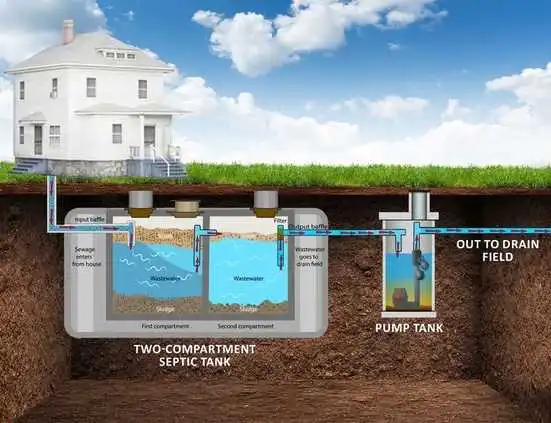Your home’s septic system may be out of sight, but it should never be out of mind. It’s one of the vital and expensive components of your home. Like the kitchen sink or washing machine, it’s used daily and needs regular upkeep. Yet many homeowners forget about it until a costly, smelly problem arises. Caring for your septic system protects your health, saves you money, and ensures a healthy environment. Let’s explore how it works, why maintenance matters, and what you can do to keep things running smoothly.
How Does a Septic System Work?
A septic system is an on-site wastewater treatment system used in homes without access to a public sewer. It typically consists of two main parts: the septic tank and the drain field.

- The septic tank is a large, watertight container made of concrete, fiberglass, or polyethylene, buried underground. Wastewater from your home (sink, toilet, laundry) flows into this tank, where solids settle at the bottom as sludge, and lighter materials like oils and grease float to the top as scum. Bacteria break down some of the solids, while the remaining liquid (effluent) flows out to the drain field.
- The drainfield is a network of perforated pipes buried in trenches filled with gravel or porous material. Effluent (The liquid wastewater) from the tank is slowly released into the soil, where it is naturally filtered and treated by microorganisms before rejoining the groundwater.
Why Is Septic System Maintenance So Important?
Neglecting your septic system can result in costly repairs, environmental hazards, and even health risks. Regular maintenance, on the other hand, offers several important benefits:
- It prevents costly repairs: Routine inspections and pumping help detect small issues, like leaks or blockages, before they escalate into major failures or full system replacements.
- It protects the environment: A functioning septic system prevents harmful bacteria and pollutants from seeping into groundwater or nearby streams. Regular pumping keeps sludge and scum from overflowing into the environment.
- It extends system lifespan: Like any mechanical system, your septic setup lasts longer when properly cared for. Prompt repairs and consistent upkeep can significantly delay the need for replacement.
What Should You Never Flush or Pour Down the Drain?
To avoid clogs and damage, here’s a list of items that should never be flushed down the drain or toilet:

- Grease, Fats, and Oils: These cool and solidify in pipes, trapping debris and causing blockages.
- Food Scraps: Flour, pasta, rice, eggshells, bones, and sticky labels can cause clogs. Use sink filters and keep small trash items out of the drain to prevent clogs.
- Hair Clippings: Common in bathroom sinks, hair easily tangles and causes stubborn clogs. Always dispose of it in the trash.
- Paper Towels and Excess Toilet Paper: Unlike toilet paper, most paper products aren’t designed to dissolve quickly. Even toilet paper, when used excessively, can lead to blockages.
- Paint and Harsh Chemicals: Paint can coat pipes and harden, reducing flow and increasing the risk of clogs. Harsh chemicals also disrupt the bacteria that help treat waste.
- Engine Oil: Toxic and slow-moving, engine oil traps debris and contaminates the environment. Always dispose of used oil at a proper recycling facility.
- Plaster or Cement: These materials harden quickly in pipes and can cause severe, often irreversible blockages.
- Wet Wipes and “Flushable” Products: Despite marketing claims, most of these don’t break down easily and can clog your system. The same goes for “biodegradable” items (diapers, sanitary pads); they take too long to decompose in a septic tank.
Landscaping and Water Habits That Help Your Septic System
Your outdoor choices can support or harm your septic system. Here’s how to care for the drain field:
- When landscaping near the drain field, select shallow-rooted plants, such as grasses and small shrubs, and avoid trees or deep-rooted plants that could damage underground pipes.
- Keep structures away from the drainfield. Don’t install sprinkler systems, decks, or build over it.
- Avoid heavy loads, never park or drive over the septic tank or drainfield. This can compress the soil and damage components.
- Direct rainwater runoff away from the system to avoid oversaturation.
- Practice water conservation. Fix any leaks and use water-efficient appliances, such as a high-efficiency washing machine. To prevent overloading your septic system, spread out water-heavy chores like laundry and dishwashing across different days instead of doing them all at once.

Conclusion
A failing septic system doesn’t always start with a sudden backup. Watch for signs like slow drains, unpleasant odors, stagnant water, or extra green patches of grass over your drain field. These signs indicate your septic system needs attention. With regular maintenance and smart daily habits, you can maintain your septic system.





